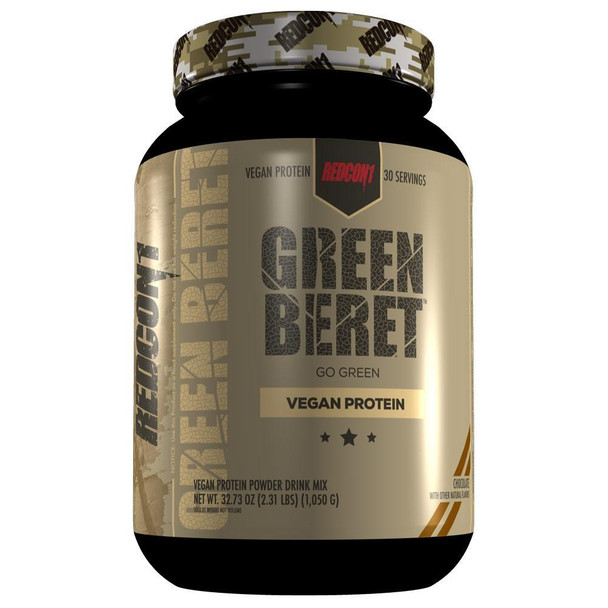Redcon1 Green Beret Vegan Protein
People never expected that Redcon1 would roll out a Vegan Friendly supplement, but they've done it. Green Beret is here! Green Beret is Redcon1's first plant based vegan protein. Green Beret is made of a diverse blend of three different protein sources which include pea isolate, brown rice, and quinoa proteins, and packs a whopping 20 grams of protein per serving. These plant based proteins can match the amino presence of Whey, and lacks almost any trace of cholesterol, making it a healthier option than whey proteins. Vegan Bodybuilders, Powerlifters, and Fitness Fanatics alike can rejoice as this, unlike many vegan proteins, is both smooth and delicious. Pickup a tub today, and try it for yourself!
Green Beret Vegan Protein Highlights
- Plant Based Protein
- 20g of Protein
- Vegan Friendly
- Super Smooth
- 3 Plant Based Protein Sources
- Naturally Sweetened
- Promotes Lean Muscle Mass
Redcon1 Green Beret Flavors
- Peanut Butter
- Chocolate
- Strawberry
- Vanilla
Everything You Need to Know About Green Beret Protein...
1. What is Green Beret Protein?
Green Beret is a Vegan Plant Based Protein.
2. Does Green Beret Contain Dairy?
Green Beret Protein Powder is plant based and consists of 3 plant based proteins. Green Beret does not contain milk or lactose.
3. Does Green Beret Protein Contain Whey?
No, there is no whey in Green Beret.
4. Does Green Beret Contain Soy?
No, there is no soy in Green Beret.
5. What Protein Sources Does Green Beret Consist of?
Green Beret Protein is made with a blend of three plant based protein sources. These sources are pea isolate, brown rice, and quinoa protein.
6. How Many Grams of Protein Per Serving?
This plant based protein contains 20 grams of protein per serving.
7. How many Carbohydrates per Serving?
There are 5 grams of carbs per serving. One gram comming from Fiber.
8. How Many Grams of Fat?
Redcon1 Green Beret contains 2 grams of fat per serving.
9. How Many Calories Per Serving?
There are 120 calories per serving.
10. Does Green Beret Contain Colors, Dyes, or Sweeteners?
Green Beret is naturally sweetened, non-GMO, and made with no artificial colors, flavors, or dyes.
How to Take Green Beret Protein
For added dietary protein, a bridge between meals or a protein-rich snack, mix 1 scoop of Green Beret with 4-6 ounces of your favorite beverage, shake well and consume. For additional protein support, take up to 3 servings per day.
Redcon1 Green Beret Supplement Facts
Serving Size: 1 Scoop
Servings Per Container: 30
Calories 120
Total Fat 2g
Saturated Fat .5g
Trans Fat 0g
Cholesterol 0mg
Sodium 260mg
Total Carbohydrate 9g
Dietary Fiber 1g
Total Sugars 0g
Protein 20g
Vitamin D 0mcg
Calcium 50mg
Iron 6mg
Potassium 96mg
*% Daily Value is based on a 2,000 calorie diet. Your daily values may be higher or lower based on your calorie needs.
*Daily Value Not Established
Ingredients: Pea Protein Isolate, Brown Rice Protein, Quinoa Protein, Coconut Water Powder, Erythritol, Red Russet Cocoa Powder, Natural Flavors, Cellulose Gum, Stevia Extract, Salt.
Warning
KEEP OUT OF REACH OF CHILDREN.
Allergen Warning
Contains: Tree nuts (coconut). Manufactured on shared equipment which processes products containing soy, tree nuts, and peanuts.
References
Vegan diets: practical advice for athletes and exercisers
David Rogersoncorresponding author
https://www.ncbi.nlm.nih.gov/pmc/articles/PMC5598028/
Health benefits and risks of plant proteins.
Krajcovicova-Kudlackova M1, Babinska K, Valachovicova M.
https://www.ncbi.nlm.nih.gov/pubmed/16201743
The Effects of Whey vs. Pea Protein on Physical Adaptations Following 8-Weeks of High-Intensity Functional Training (HIFT): A Pilot Study
Amy Banaszek, Jeremy R. Townsend,* David Bender, William C. Vantrease, Autumn C. Marshall, and Kent D. Johnson
https://www.ncbi.nlm.nih.gov/pmc/articles/PMC6358922/
The Skeletal Muscle Anabolic Response to Plant- versus Animal-Based Protein Consumption.
van Vliet S1, Burd NA1, van Loon LJ2.
https://www.ncbi.nlm.nih.gov/pubmed/26224750
†This product comes with no guarantees from the U.S. Food and Drug Administration regarding its safety or efficacy. The agency has not evaluated the claims made about this product’s benefits, leaving its ability to diagnose, treat, cure, or prevent any medical condition or disease in question. As consumers, it's vital to approach such supplements with caution and conduct thorough research or consult healthcare professionals before integrating them into your health regimen.
†Product images represent the product offered but may not contain exact attributes. Please read the product description for the specific attributes of this product.












